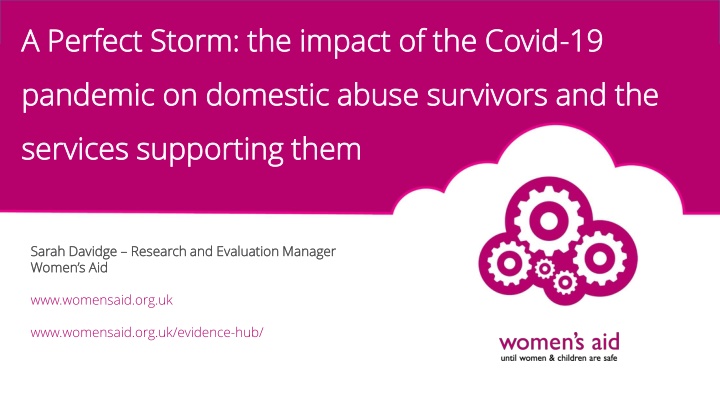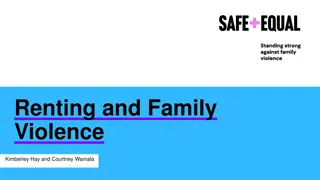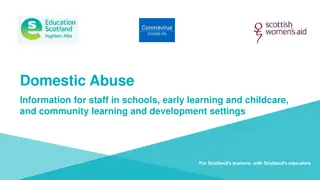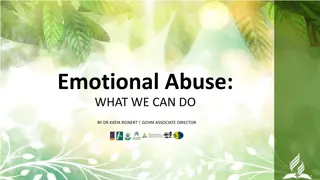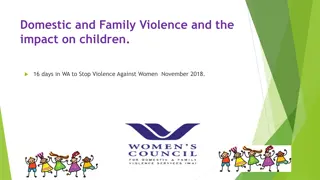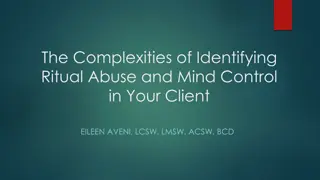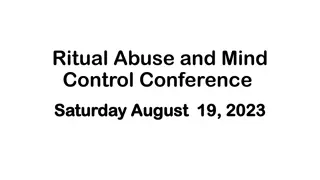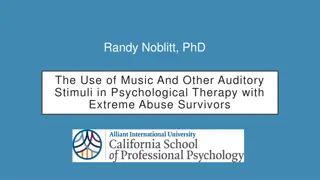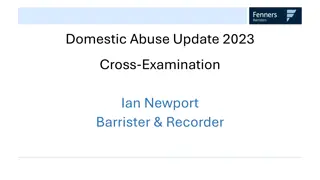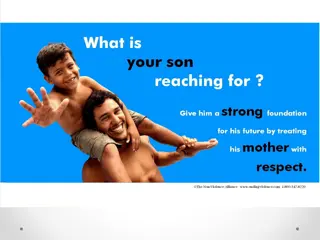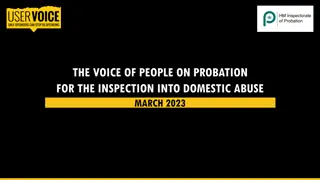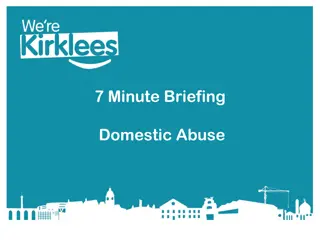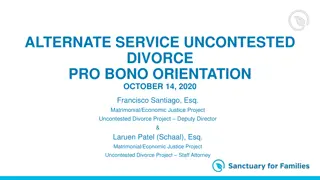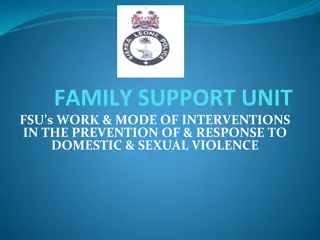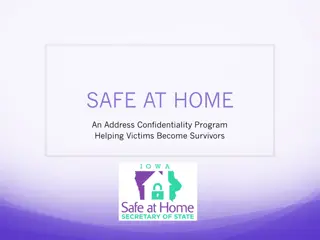Impact of Covid-19 on Domestic Abuse Survivors and Support Services
Domestic abuse, a pattern of controlling and coercive behavior within intimate or family relationships, has been exacerbated by the Covid-19 pandemic. Abusers have used the pandemic to further manipulate and control survivors, leading to increased isolation and fear. Women experiencing domestic abuse have faced challenges in seeking help and support due to the restrictions imposed by the pandemic. Specialist domestic abuse support services have also been impacted, struggling to meet the increased demand for assistance.
Download Presentation

Please find below an Image/Link to download the presentation.
The content on the website is provided AS IS for your information and personal use only. It may not be sold, licensed, or shared on other websites without obtaining consent from the author.If you encounter any issues during the download, it is possible that the publisher has removed the file from their server.
You are allowed to download the files provided on this website for personal or commercial use, subject to the condition that they are used lawfully. All files are the property of their respective owners.
The content on the website is provided AS IS for your information and personal use only. It may not be sold, licensed, or shared on other websites without obtaining consent from the author.
E N D
Presentation Transcript
A Perfect Storm: the impact of the Covid A Perfect Storm: the impact of the Covid- -19 pandemic on domestic abuse survivors and the pandemic on domestic abuse survivors and the services supporting them services supporting them 19 Sarah Davidge Sarah Davidge Research and Evaluation Manager Research and Evaluation Manager Women s Aid Women s Aid www.womensaid.org.uk www.womensaid.org.uk/evidence-hub/
What is domestic abuse Domestic abuse takes place within an intimate or family relationship using a pattern of controlling, coercive, threatening, degrading or violent behaviour making it very hard for women to end the relationship Coercive control is an act or a pattern of acts of assault, threats, humiliation and intimidation or other abuse that is used to harm, punish, or frighten their victim. It can involve any or all of physical or sexual violence; emotional and/or psychological abuse; financial or economic abuse; harassment and stalking; and online or digital abuse Domestic abuse can happen to anyone, regardless of age, social background, gender, religion, sexuality or ethnicity . It is very common and in most cases is experienced by women and perpetrated by men.
A Perfect Storm: Womens Aid research on the impact of Covid-19 1. In what ways have abusers used the Covid-19 pandemic as a tool for domestic abuse? 2. In what ways have the choices and needs of women experiencing domestic abuse been impacted by Covid-19? 3. In what ways has the Covid-19 pandemic affected the specialist domestic abuse support sector? https://www.womensaid.org.uk/evidence https://www.womensaid.org.uk/evidence- -hub/ hub/
How have abusers used the pandemic as a tool for abuse 67% said that their abuser had used the pandemic as a tool for abuse in one or more way/s. 38% said their abuser refused to take precautions against the virus. 46% of survivors currently experiencing domestic abuse told us that their abuser has made them feel bad for being scared or worried about Covid-19. I m shielding and [my abuser] uses not getting me food or medication to control me . my ex-partner has used his knowledge of my reduced support network to escalate his emotionally abusive & controlling behaviour - thinking that I have no one to turn to 30% said their abuser had blamed them for the economic impact of Covid-19 on their household. (Women s Aid April and June Survivor Surveys)
Survivors are experiencing increased isolation and fear Since lockdown: Since lockdown: I m lonely, feel isolated, like a sitting duck. when he had been abusive no-one would come and help due to the Covid- 19... 52% of survivors responding felt more afraid 58% felt they had no-one to turn to 32% felt friends and family couldn t help them leave Living with my ex felt like being imprisoned in my home, this lockdown has bought back feelings of fear, loneliness, isolation. 53% of survivors who had experienced abuse in the past, said that the pandemic had triggered memories of abuse and affected their mental health. (Women s Aid June Survivor Survey)
Survivors are seeing their means of escape reduced I am working from home and my partner is a key worker but been home all the time I can t get out to view flats and leave Covid Covid- -19 can make it more difficult for women to leave 19 can make it more difficult for women to leave an abuser, particularly if they share a home: an abuser, particularly if they share a home: In April over three quarters of survivors (78.3%) told us that Covid-19 has made it harder for them to leave their abuser. In June, 48% of those living with the abuser still felt they couldn t leave or get away because of the pandemic 10% of survivors experiencing current abuse said they d tried to leave and the abuser had used restrictions to stop them leaving Leaving hasn't been something I can consider because of the pandemic. Things are escalating and I'm sure it's going to continue getting worse.
Child survivors also experienced worsening abuse during lockdown. Of survivors with children: Of survivors with children: 53.1% told us that their children have witnessed more abuse towards them 37.5% said their abuser had shown an increase in abusive behaviour directed towards their children. 47% expressed their fear that the children would be left alone with the abuser if they became ill I have two small children They are experiencing more [abuse] as they are witnessing it more My biggest concern is that my child may be given back to our abuser if I were to become seriously unwell with the virus or not survive. . . (Women s Aid April Survivor Survey)
Impact on local domestic abuse support services We have found that more women referred to our community-based services have needed longer term and more in-depth support than before the pandemic. We think this is because they generally have complex needs and also there is a lack of availability of other agencies to support them. We need more trained staff in order to cope with demand in the future. Service providers have reported that their capacity to Service providers have reported that their capacity to support survivors is impacted by Covid support survivors is impacted by Covid- -19: Impact on fundraising, including concerns around future funding Impact on staff including challenges around caring roles and negative impact on mental health Challenges preparing for remote working Reduced availability of refuge spaces and move on accommodation during lockdown Concerns around future demand 19:
Womens Aid research into impact of Covid-19 I wanted to leave the relationship. However since Covid-19 and the lockdown coming into effect it has made it harder to leave. I am a keyworker who is around COVID +ve patients, so I don t feel like I could go home and stay with my parents It s hell on earth living 24/7 now with my abuser & can t get out to escape put distance between us when I feel tension rising More time at home magnifies the issues, you can t get away from it, I have to work harder to keep him happy. Find out more at: Find out more at: https://www.womensaid.org.uk/evidence https://www.womensaid.org.uk/evidence- -hub/ hub/ Contact us at Contact us at research@womensaid.org.uk research@womensaid.org.uk
